
2025/26




2025/26


We’ve put together this guide to help you settle back into life in Exeter.
Over the summer, we’ve been busy preparing for your return and you can find out what to expect later in this guide.
But this guide isn’t just for the start of term, it’s also filled with advice which will be useful throughout the year. Whether you want to get involved in activities on and off campus, you’re moving into a new home in the local area, or you just need to know where to get support – everything you need is here. At the back of the guide you’ll also find a list of useful contacts for the University and beyond.
Throughout your time with us there is lots of support you can access, including:
Wellbeing Services – free advice, support and guidance exeter.ac.uk/ students/wellbeing
Study Skills – learning and studying support https://libguides.exeter.ac.uk/ skills
Education Welfare Team – for any academic concerns exeter.ac.uk/ students/wellbeing/talk/welfare
Students’ Guild Advice Team –impartial, confidential advice exeterguild.com/advice
Chaplaincy – for those of all faiths and none exeter.ac.uk/students/chaplaincy
Community Engagement Team –advice and support for students living in private accommodation exeter.ac.uk/about/community/uni
International Student Experience –supporting non-UK students across all our campuses exeter.ac.uk/students/ international
Pastoral Mentors – embedded within departments, support undergraduate and postgraduate taught students exeter.ac.uk/students/pastoral-mentors
Remember there’s wellbeing support for you – find out what’s on offer and how to get in touch on our website exeter.ac.uk/students/ wellbeing
We recommend you register with a doctor (GP) whilst at Uni, if you haven’t already. You can join the Student Health Centre on Streatham Campus, or one close to your home – find your nearest on the NHS website nhs.uk/service-search/find-a-gp
Your doctor’s surgery can help with repeat prescriptions of medicines if you need them and vaccinations if you’re eligible – such as flu, Covid-19.
Call the NHS on 111 or go to 111.nhs.uk online for health advice when your doctor’s surgery is closed. This includes mental health support.
Be aware of the signs of meningitis, as it is a potentially life-threatening condition. You can also have the ACWY vaccine if you’ve not already but it doesn’t cover all strains so make sure you know the symptoms. nhs.uk/conditions/meningitis/symptoms
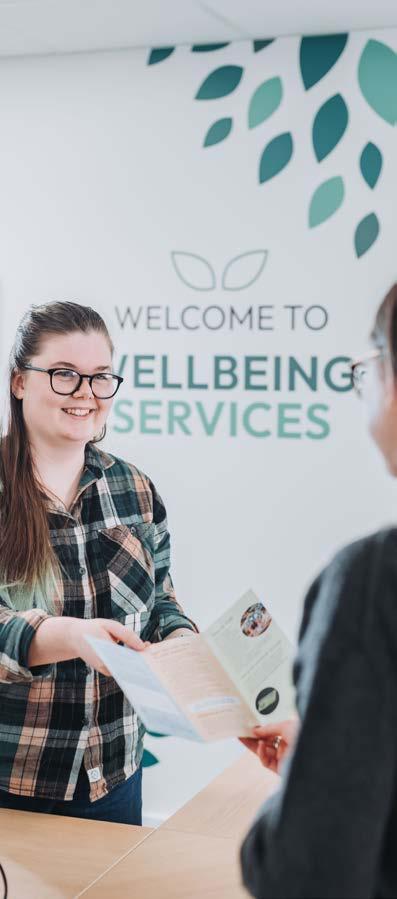
There’s more on our website: exeter.ac.uk/ students/health

We know you may feel anxious about managing your money at uni, so we have some tips to help you keep on top of your finances.
Work out your budget
Look at your money and how long it needs to last you. Work out how much you need for all your essential contracted fixed costs, such as rent and your phone bill – and make sure you can pay these first. The Money
Helper Budget Planner may help you, or there are other free budgeting tools online. moneyhelper.org.uk/en/everyday-money/ budgeting/budget-planner
Your Students’ Guild can also help you with budgeting advice. exeterguild.com/advice
We remind you that while you live in Exeter, as well as being part of the University, you are part of the local community and we expect you to be mindful of how you act and ask that you continue to be respectful in the city.
Look out for deals and savings
Check out Save The Student for the latest deals and freebies out there savethestudent.org/student-deals and see exeter.ac.uk/students/costofliving/devon for deals and money saving tips on campus.
Ask for help
We have lots more information and advice to help you manage your finances, and support available if you’re struggling, on our Cost of Living webpages: exeter.ac.uk/ students/costofliving/devon
Don’t be tempted to use loan sharks, illegal money lenders, or quick-money schemes that may not be legitimate. If you’re struggling you can apply to our Success for All Fund for help during your time at Exeter. exeter.ac.uk/students/financialhelp
You must abide by our ‘Community Charter’ which outlines the General Student Regulations and the personal commitments we must all make to keep our community safe. Scan the QR code to find out more.
Welcome back to Exeter! Let’s hit refresh with a quick intro (or reminder) about your Students’ Guild – aka your students’ union, here to make your Exeter experience 10/10.
As an Exeter student, you’re automatically part of the Guild. That means you’ve got access to the top parts of uni life, from events to advice and everything in between.
So... what does the Guild actually do?
Your Students’ Guild is your go-to place for societies, epic events, real talk support, and a place to openly be your best self. It’s all about helping you find your people, your passion, and your place here at Exeter.
Community and belonging
Uni’s better when you’re surrounded by good vibes and great people. Whether you’re joining an academic society, celebrating your identity, or just looking to meet new mates – there’s space for everyone here. exeterguild.com/getinvolved
Activities and volunteering There’s more to Exeter than lectures and deadlines. Wanna try something new, boost your CV, or just have fun? There are over 300+ societies and tons of volunteering opps to help you grow, connect, and maybe even meet your future besties. exeterguild.com/societies
Arts and music
Got creative energy to burn? Whether you’re into performing, producing, or just exploring your inner artist, there’s a whole world of music, theatre, and creative spaces waiting for you. From singers to tech wizards – we’re ready to hear from you! exeterguild.com/music
Campaigning and representation
Want to make change? You don’t need to be a seasoned activist — just someone who cares. The Guild’s got your back with tools and support to help you speak up and be heard. We’re talking real action too, like serving 4,000+ meals with our Feed Your Flat events and improving academic mitigation. exeterguild.com/campaigns
Advice and support
Stressed about your course? Housing probs? Money worries? No judgment, just real, free advice from Guild advisors who get it. exeterguild.com/advice
Through the ups and downs of uni life, you’re never alone. Your Students’ Guild is here to help you through it.

Did you know you can vote in the Exeter City Council and/or the Devon County Council elections, while you are living here? Plus you may be eligible to vote in the UK Parliament elections. We encourage you to take part and ensure that your voice is heard! exeter.ac.uk/ students/yourvoice/registertovote
To find out more about registering to vote visit: register-to-votegov.uk/(Please be aware that some international students will not be allowed to vote in the UK).
At Exeter you have the chance to participate in health and fitness at a time and level that’s right for you. There are 52 sports clubs supporting athletes competing at every level; Social sport offering league, event and Pitch up and Play sessions focused on regular physical activity; two university campus gyms including a 200-station fitness centre with flexible membership options. With so much more on offer, head to sport.exeter.ac.uk for more information.
We hold free English language skills development courses both for students and their spouses. Why not join a conversation café, a language class concentrating on oral or written skills or a cultural competence session? They are a great way to improve your language skills and meet new people. For more information see exeter.ac.uk/intoenglishlanguage
Do you have an idea for a community project? The University’s Community Fund helps projects that enhance the relationship between students and Exeter’s permanent residents. It is open to student societies too. If you have an idea, email r.j.cunningham@exeter.ac.uk
It’s still really important to connect with local community or resident groups. If you’d like to get involved, contact: communityengagement@ exeter.ac.uk
If you want to meet new people and increase your confidence, come to the weekly Intercultural Cafés on Streatham Campus. Enjoy a free hot drink and a pastry while sharing ideas and activities. No need to book, just come along. We look forward to welcoming you. We also hold regular cultural events on campus. Join us for Diwali, Christmas and Spring Festival celebrations.
Get active – To reduce our climate footprint and improve your wellbeing, why not use sustainable forms of transport?
Choosing to travel around on foot or by bike is a great way of keeping active and enjoying the health and wellbeing benefits that physical activity brings. It also saves money and helps to reduce local congestion and air quality issues.
Here are some great alternatives to having a car…
On your bike – Whether you’re heading from campus to the cathedral or from the shops to the seashore, with fantastic cycle routes and ample cycle parking city wide you can get almost anywhere in the Exeter area by bike! Find Devon’s cycle routes here: traveldevon.info/cycle/ cycle-routes
Cycle support – The University’s Sustainability team offers advice and support to help keep you and your cycle safe – find out how they can help: exeter.ac.uk/ sustainability/travel/bike. This year we have also increased the number of bike racks available to help you travel sustainably and actively where possible. Advice on buying a bike, cycle routes and handy discounts is regularly circulated to members of the Unicycle mailing list – scan the QR codes for further information.
Explore – There’s a variety of traffic-free walking and cycling routes so, whether you prefer the countryside or seaside, why not get out and explore the area? We recommend starting with the Exe Estuary Trail – a beautiful route along both sides of the estuary connecting Exmouth and Dawlish to Exeter Quay. Visit traveldevon.info for information and inspiration.

Don’t be dim: if you choose to cycle, please ensure you are road legal with front and rear lights.
Sustainability website
Unicycle mailing list

All aboard! – You can get 1/3 off tickets with a Young Person’s Railcard. So get away from essays for the day and explore what the beautiful South West has to offer greatscenicrailways.co.uk. Visit 16-25railcard.co.uk for more information.
On the buses – Carrying your weekly shop, or dodging the rain? You can always catch one of the regular buses which run from the city centre to the Streatham and St Luke’s campuses. The Line 4 bus service runs from morning until late at night. You can buy a discounted Termrider Ticket – Exeter Area online at stagecoachbus.com/regionaltickets/south-west/ greater-exeter/unirider or check out exeter.ac.uk/ sustainability/travel/buscoach for more information.
Cars and parking – We strongly advise you not to bring a car, as parking is a real challenge in Exeter. There is no parking on campus for students who live within the city boundary and hardly any off-campus parking is available nearby. The Streatham and St Luke’s campuses are within easy walking distance of the city centre and parking charges are high in the city. If you do decide that you really need to bring a car to Exeter, please ensure you always park safely and considerately and ensure that you are not blocking access for larger vehicles including buses and emergency vehicles. If you have a resident’s parking permit read the terms and conditions carefully, as any breach can result in the permanent withdrawal of permits. Remember swapping or selling your permit is not allowed! Visit exeter.ac.uk/carparking for more.
Car Sharing – If you find no alternative to using your car to commute to Exeter campuses, don’t travel alone, but remember to register on liftshare.com/ uk/community/universityexeter to share your journeys with other students. If you are eligible, parking on Exeter’s campuses is free for carshares.
Useful websites:
exeter.ac.uk/sustainability/travel –find out all you need to know about travelling to, from and between the Exeter campuses.
cyclestreets.org – plan your routes from A to B by bike using their UK-wide cycle journey planner system.
stagecoachbus.com – find a timetable, plan your journey or buy your tickets online for bus travel around Devon and beyond.
nationalrail.co.uk – book in advance for cheap train tickets. Or go with friends and grab the group discount.
Exeter is generally a safe city, but it’s always best to be aware of potential dangers and take some precautions…
Drink and vape spiking
n Never accept a drink or vape from a stranger, and don’t leave your drink or vape unattended.
n Don’t accept a drink if you haven’t seen it being poured/opened.
n If you start to feel strange or more drunk than you should be, get help straight away.
Find out more about signs of drink spiking and getting help at drinkaware.co.uk/ advice-and-support/help-to-supportsomeone-else/drink-spiking-and-daterape-drugs
Spiking includes adding alcohol, drugs or other unwanted chemicals to someone’s drink or vape without their knowledge. It’s a crime and carries a maximum 10 year prison sentence. Find out more online at devoncornwall.police.uk/spiking
Staying safe online
Keep you and your devices protected. When you’re online it’s important to stay safe and make sure you don’t share things that could put you in danger:
n Use secure and unique passwords for all devices and apps
n Keep your antivirus software up to date
n If you receive an email from a stranger, think before clicking on a link or an attachment – it could contain a virus.
n If you believe that your smartphone or computer has been hacked or compromised, stop using it immediately
and get advice from a repair shop.
n Be careful who you chat to, if somebody you don’t know adds you as a friend, ignore them and delete their request.
n Don’t share personal information like your address or phone number with somebody you don’t know. Most importantly don’t share bank details.
n Think before you post something on social media.
For more details: exeter.ac.uk/students/ support-report/advice/online-abuse
Sexual consent
n Consent means that you give permission, or that someone has given you permission to engage in any intimate activity or sex. Any sexual contact without consent is illegal.
n Consent is an essential part of healthy relationships and it’s really important to understand when it has been given. Consent can be retracted at anytime.
n In addition to verbal responses, recognising and accepting non-verbal cues and body language are just as important when gaining consent.
n Find out more about healthy relationships exeter.ac.uk/students/ stay-safe/healthy-relationships
You can get advice and support from us at any time. Contact our Wellbeing Team at exeter.ac.uk/students/wellbeing or go to our Support and Report web pages.
We expect everyone to complete our consent training module found here:
If you’re feeling uncomfortable or need help on a night out there are a number of different ways to get support. In an emergency you should always call 999.

Many venues in Exeter have been Best Bar None accredited, meaning they have met high standards to reduce alcohol related crime and antisocial behaviour by providing a safe venue for customers to enjoy. All of them have a vulnerability policy and Ask for Angela as standard. Look out for the Best Bar None logo in their venues.
These go under different names in different venues but an example is the very successful scheme in Timepiece where “Care Bears” look after anyone who needs a bit of support due to alcohol consumption, or just someone to talk to. They can help with locating friends or arranging to get you home.
Exeter Venues displaying the SWAN logo have signed up to the Safety of Women at Night Charter. This means that those venues that display the logo have taken industry leading measures to reduce vulnerability of women at night throughout the city. If you require assistance any one of these venues will help you even if you are not their customer.

Currently in operation in the Exeter Students’ Guild venue The Ram and in all Best Bar None venues within the city. Anyone in a vulnerable or uncomfortable situation that needs help can ask “for Angela” at the bar or to a member of staff who will then discreetly ensure they are taken to a safe place already allocated in the venue. From there a parent, friend or taxi can be called and if necessary, the other person asked to leave the venue.
Street Pastors help all people, whether or not you have a faith. They offer reassurance, safety and support through listening, caring and helping. Exeter Street Pastors are out on a Friday and Saturday night in Exeter City Centre.
Seen a situation you feel is wrong? Wanted to intervene but didn’t know how? Why not sign up to our Bystander Intervention training, where you can learn skills and techniques to help. Find out more at exeter.ac.uk/departments/inclusion/ support/training/exe-changethenorm
For more info on staying safe see our web pages: exeter.ac.uk/students/stay-safe
When you go out, there are a few things you should think about so you can make the most of your nights out and stay safe.
The best way to stay safe is to stick with your friends, read below for more tips.
Always remember:
n Cover up expensive-looking jewellery, mobile phones, keys, cash and cards.
n Get a taxi – save some cash for the end of the night so you can be brought straight home – it’s much safer. Please be aware that official taxis will display a green or yellow license number – never get into an unmarked taxi.
n Use the Line 4 service in Exeter. It runs from Monday to Saturday, until late at night. The service will incorporate the Streatham Campus and is designed to support students returning from the city centre. You can use all Stagecoach network tickets on this service along with the discounted Termrider tickets. Currently the single fare is only £2, as we’ve subsidised the service to keep the price low for our students. exeter.ac.uk/about/sustainability/travel/ buscoach
n If you find yourself in trouble, the best form of defence is to get away and head towards busier areas.
n If you are trapped, bring attention to yourself and make as much noise as possible by shouting or screaming.
n In an emergency, call 999 as soon as it is possible to do so and never feel ashamed to report something.
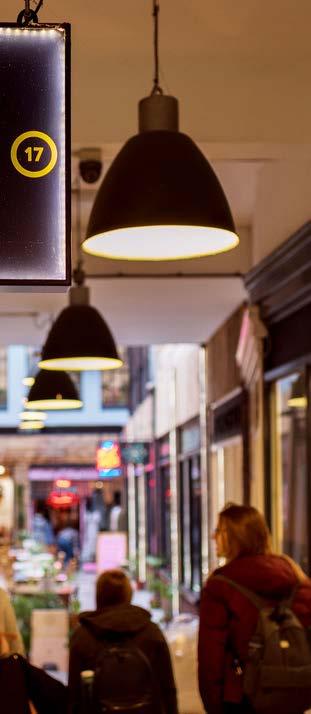
Download SafeZone
SafeZone is our free app for your personal safety that connects you directly to the University Estate Patrol team. It provides a quick and easy way for you to alert them if you ever need urgent help when you’re on campus.
Scan to download SafeZone App
For more tips, visit the University Safety Guide: exeter.ac.uk/departments/ campusservices/ campussecurity/ safety-guide

The above map shows the drinking ban area within Exeter.
When walking around the city, stay safe. Stick to well-lit areas in the evening and walk with your friends if you can.

Please also be mindful of noise when walking through residential areas, our neighbours really appreciate it.
The University of Exeter is an inclusive community, where everyone has the right to be treated with respect. Discrimination, bullying, intimidation and harassment, including sexual harassment, go against all we stand for and will not be tolerated.
Did you know? It is not permitted to drink alcohol in the street in most parts of Exeter, including the city centre. The Police can confiscate your alcohol, and those who refuse could even face arrest!









Railway line and station
Drinking ban area
If you’ve experienced or witnessed any of these we have a wide range of support for you. You can also report it to us. exeter.ac.uk/students/support-report
Devon is generally a very safe place to live. However, crimes do occasionally occur. These tips are designed to help keep you and your things safe.
Find out more on our safety pages exeter.ac.uk/students/stay-safe
Did you know?
n You’re more likely to experience violence when alcohol is involved, so be aware and stay safe if you’re drinking. Almost half of crimes that affect students in Devon and Cornwall involve violence.
n Look out for your possessions – theft makes up around 15% of crimes affecting students.
Fraud, tricks and scams
Unfortunately, some criminals try to get money from students. Some of these scams will seem very convincing and persuasive and it can be frightening.
If you’re contacted by someone and it seems unusual, unexpected or just odd, please end the call/communication. If the person who contacted you is genuine they won’t mind you checking and then getting back to them. If you believe you have been involved in a scam, contact Estate Patrol exeter.ac.uk/campussecurity who can offer you advice on what to do next, and inform the Police by calling 101. You should also report the incident to Action Fraud (actionfraud.police.uk) and your bank if
Didyouknow? Many laptops and other valuables are stolen from study areas each year, if youwanttokeepyourstuff, learn to keep it safe!
money is involved. You can find examples of recent scams to look out for on our Scam Targeting Students page.
Find out more about keeping safe online on our Cybersecurity overview.
If you’re an international student there’s more safety information for you at: exeter.ac.uk/students/international/ livingintheuk/fraudtricksandscams
Take some simple precautions:
n Know your boundaries, do not drink excessively and be respectful to others.
n On a night out, be aware of your surroundings and stay together with friends when possible.
n Never hesitate to call for help! If something feels wrong, get to a safe place, shout loudly for help and call the police.
n Keep your possessions out of sight, and don’t leave valuables unattended.

“I had my laptop nicked last year –someone just opened my unlocked ground floor bedroom window and grabbed it. It wasn’t security marked and I had loads of personal stuff on there –including my dissertation…”
3rd Year Student
Opportunist thieves may target student houses:
n Always lock your windows and doors. Sounds obvious but if you don’t then you’re more likely to be burgled.
n Keep valuables out of sight, away from windows or doors and never leave them on show. Don’t advertise your valuables to the local burglar.
n Security-mark your valuables. Write on your name and HOME postcode with a UV pen. Register your items for free at immobilise.com – so they can be traced back to you if they’re recovered.
n Don’t keep spare keys ‘hidden’ anywhere obvious. That includes the shed and garage as well as the disused flowerpot by the front door.
n Lock your bicycle, know the frame number. Take a photo. Register your bike with bikeregister.com
n Look out for the free security marking sessions that your Community Engagement Team run throughout the year exeter.ac.uk/about/community/uni
Insurers often don’t pay a claim unless you’ve done the above.
Reporting crime or getting help is easier than ever, and the police will be happy to help. You can:
n Email: 101@dc.police.uk or phone 101
n Report online and find answers to most questions at devon-cornwall.police.uk
n Sign up to Devon and Cornwall Alert, for all the latest events, crime information and help at alerts.dc.police.uk
n In an emergency always call 999
Over the holidays student houses can be vulnerable to burglary, so take valuables with you, put them in secure storage or ask a friend to look after them.
A hate crime is any crime perceived to have been motivated by hostility or prejudice.
It can be committed against a person or their property based on:
n Disability
n Race or ethnicity
n Religion or belief
n Sexual orientation
n Gender identity
n Or any part of someone’s personal identity
Hate crimes can include things like:
n Being called names or other forms of verbal abuse
n Being sent offensive letters, emails or text messages
n Being attacked or threatened with violence
n Having your property interfered with or damaged

If any of these things are happening to you, you should report them to the police and also report them to the University at exeter.ac.uk/students/ support-report. The University and police take reports of hate crime seriously. We have a zero tolerance approach to hate crime and work together on this. The University’s Support and Report tool includes options to report informally and anonymously if you prefer.
If it is an emergency where life is threatened, people are injured or offenders are nearby and an urgent response is required, ring 999.
To find out how to report a hate crime to the police, or anonymously through a third party, visit the website: exeter.ac.uk/students/ support-report
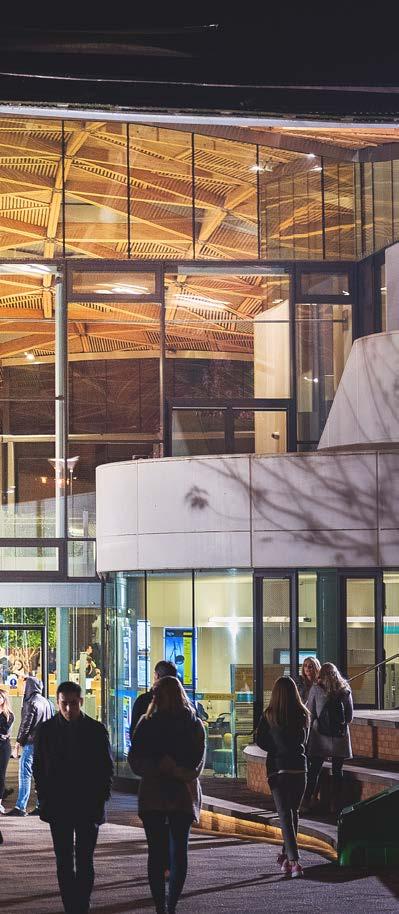

Fire safety in your home and other buildings –Reduce the risk of fire and know what to do to help keep yourself and others safe.
In the event of a fire… get out…stay out… Call 999.
n If you hear a fire alarm leave the building immediately and don’t go back in until it is safe to do so.
n Make yourself aware of the way out of the building and don’t obstruct doors or corridors.
n Never remove or cover your smoke or carbon monoxide detector.
n Take care when cooking, particularly with oil.
n Don’t get distracted, keep an eye on your cooking.
n Check your contract for any do’s and don’ts like smoking, vaping and candles.
n Extension leads generate heat so should be used carefully. Do not overload sockets.
n Charge your devices on a hard surface and never on a carpet, chair or bed.
n Don’t leave cooking unattended and turn off appliances when you’re finished with them.
n Don’t cook if you have been drinking alcohol, especially late at night.
n Contact your landlord if you have any fire safety concerns.
Living with new people for the first time can be a very big change, but the reality of living with friends that you have known for a while can be challenging. The following advice has come from students who have lived in shared accommodation before:
n Meet regularly: Students in shared accommodation who meet regularly have a much better time. House/flat meetings can help air tensions, create an atmosphere of support and help to tackle practical issues more easily (like paying bills, addressing noise, etc.)
n Create a rota: Agreeing a rota for domestic tasks can be very helpful. In our experience, jobs like cleaning the house, taking out the bins etc. can quickly escalate and cause households to argue. Start with a plan! There are many cleaning-rota templates online.
n Ask for help: If things go wrong, it is also important to know when to ask for help. The following people can help you:
communityengagement@exeter.ac.uk – For questions about bins, recycling, household security, tensions with neighbours or anything ‘practical’ connected to your address.
advice@exeterguild.com – If you have a question about your contract, finances or you are having problems with housemates.
wellbeing@exeter.ac.uk – If you have any concerns about your wellbeing or the wellbeing of other students at your address.
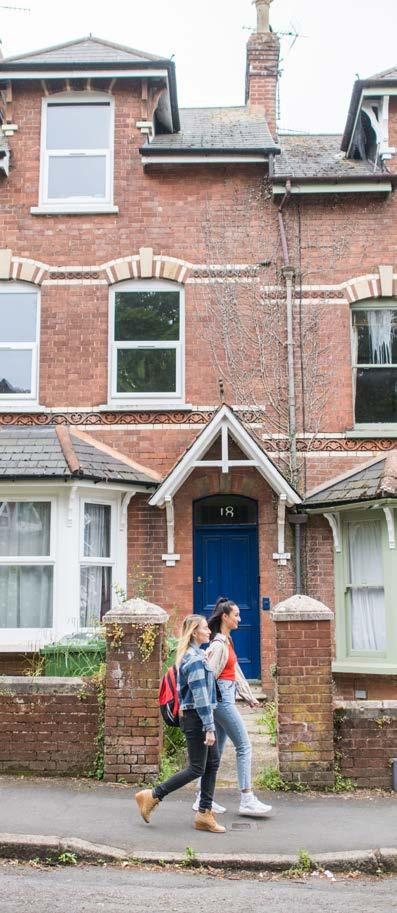
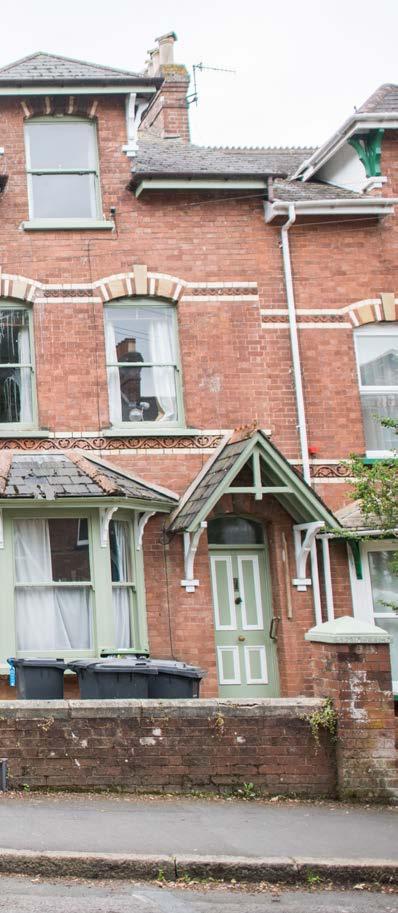

If you’re moving from University accommodation into the community, this can be an exciting time.
Renting a house or flat with friends will be a big part of your university life and it’s a great opportunity to meet new people. However, it comes with new responsibilities and new neighbours.
It’s always important to maintain good relations within your community and it’s important to get to know your neighbours. This section of the guide has advice for living in the community, from how to introduce yourself to your neighbours, to transport information and what to do with your rubbish.
Hello, we’re your Community Engagement Team.
New term, new house, maybe new housemates too… there can be lots of things to think about when moving into a new place. That’s why we’ve gone to the experts to collect their advice: previous Community Engagement Officers, permanent residents and, of course, the students who’ve come before you. The following pages should answer a lot of your questions – from how to protect your laptop to what you can recycle and much more…

Or any problems in your local area – just email us at communityengagement@ exeter.ac.uk If we can’t assist you directly, we’ll help to find someone who can. Don’t forget to indicate which street you live in.
To find out who your local Community Engagement Officers are visit: exeter.ac.uk/about/community/uni

Watch our housing videos. exeter.ac.uk/about/community/ students/accommodation
Your Community Engagement Officers are all students employed by the Uni. We work with the Students’ Guild, the local Police and the City Council to support students living off campus.
How we can help you?
We can help you security-mark your belongings and organise a community project, as well as give you information on how to keep you, your house and your stuff safe. We will make a big push to introduce ourselves face-to-face at the start of your tenancy. Please take the time to read our advice, it really could help to smooth out your time here in Exeter. Hopefully you’ll enjoy living in this great city as much as we do.
Understanding those who live around you is an important first step in becoming part of a community, and we recommend that you introduce yourselves to your neighbours as soon as possible after moving in to your new property (including those who might live behind your property).
Please bear in mind that many of your neighbours will be working from home. It’s really important that you get to know your neighbours and to open a clear channel of communication with them, so that boundaries can be understood, and lifestyles can be respected from the start of your tenancy.
For guidance on how to live in Exeter exeter.ac.uk/about/community/students
Here’s the essential checklist of stuff to do now you’ve arrived in your new home:
n Meet your neighbours – It’s really important to get to know your neighbours. Why not introduce yourself by putting a note through your neighbours’ letter boxes with your names and a phone number to arrange a time to have a chat? Don’t forget to include the neighbours who live behind your home as well as the ones on either side!
n Check your inventory – your landlord should provide you with an inventory (if they don’t, make sure you write your own) so that you can both agree on the initial contents and state of the house.
n Read your meters – if your gas and electricity bills are quarterly you’ll need to do this asap so you don’t risk getting charged for the previous tenant’s fuel use. Contact your gas and electricity providers to give them the reading and ask them to put the names of all the tenants on the bill. Check your meter even if your bills are included.
n Take date-stamped photos of every room –especially anything that’s not in good, clean condition. This means you’ll have evidence of what the house was like when you got the keys, which could prevent issues later.
n Something wrong? Inform your landlord or agent – if it’s a dodgy doorknob, growing mould, vermin or a window that won’t shut properly – inform your landlord in writing and keep a copy. List exactly what’s wrong and agree a reasonable deadline for when it should be sorted.
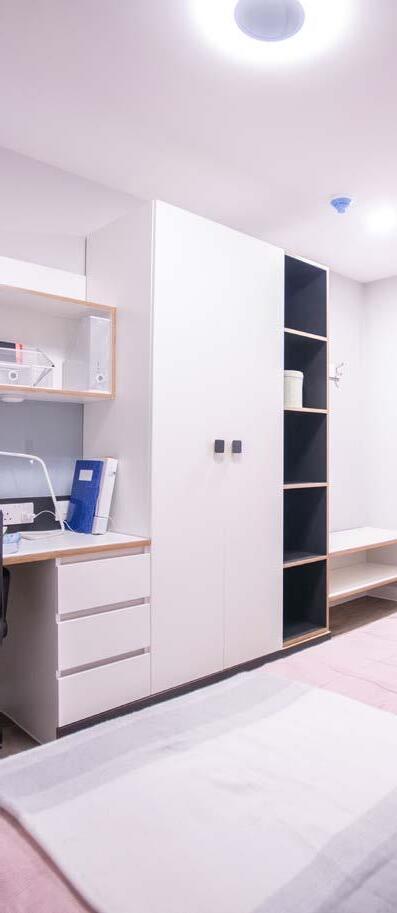

n Register to vote at your new address: You can vote in local and national elections if you are eligible and your name is on the electoral register. As a student you are entitled to register to vote at both your home and University addresses, but you can’t vote more than once in the same election. Find out more at: exeter.ac.uk/students/yourvoice/registertovote
n Prescribed information: Your landlord is legally obliged to give you certain information such as the gas safety certificate, Energy Performance Certificate and Deposit information. Most will do this no problem, but if you are unsure the Students’ Guild’s advice team can help you: exeterguild.org/ housing/paperwork
n Make sure to pay your TV licence if you watch TV live on any device or catch up programmes on iPlayer. Unsure if you need one? Check: tvlicensing.co.uk/ check-if-you-need-one
n Living together can be exciting but it can also bring challenges. If you find that you’re struggling to get along with your house mates, the Community Engagement Officers may be able to signpost you to some further help: communityengagement@ exeter.ac.uk.
Exeter Studentpad
Studentpad lets you search for student houses, flats and lodgings in Exeter and the UK. Find your perfect student house with Studentpad!
Visit: exeterstudentpad.co.uk/ accommodation
The lovely people in the Students’ Guild Advice Team can give free advice, information and support on a whole range of housing queries, like problems with landlords, or housemate disputes.
Visit exeterguild.org/advice to book an appointment and find more information.
The Council has introduced weekly food waste collections to many areas of the city. Houses with food waste collections should have an outdoors caddy and an indoors caddy.
It’s important to contain your food in bags inside the caddy. You can use any bag – old bread bags and cereal bags work very well. They will all be removed by the food waste plant before the food is recycled.
Don’t put any other packaging in your food waste bin or it will not be collected. More information can be found at exeter.gov.uk/foodwaste
Your green bins or boxes are collected once a fortnight. You can recycle the following:
n paper and card (except wrapping paper), including magazines, junk mail, envelopes and old notes
n cans, tins, foil and empty aerosols
n plastic bottles (keep lids on), pots, tubs, trays and shopping bags (no compostable bags).
For a comprehensive A-Z of what you can and can’t recycle, see exeter.gov.uk/recycle
Put your recycling loose in the bins and don’t contaminate it with anything that isn’t on the list or you could be left with the whole lot for another two weeks!
For more information on bins and collection days, visit exeter.gov.uk/domesticwaste
And remember: if you live in private accommodation off campus, you cannot dispose of your domestic waste in University bins!
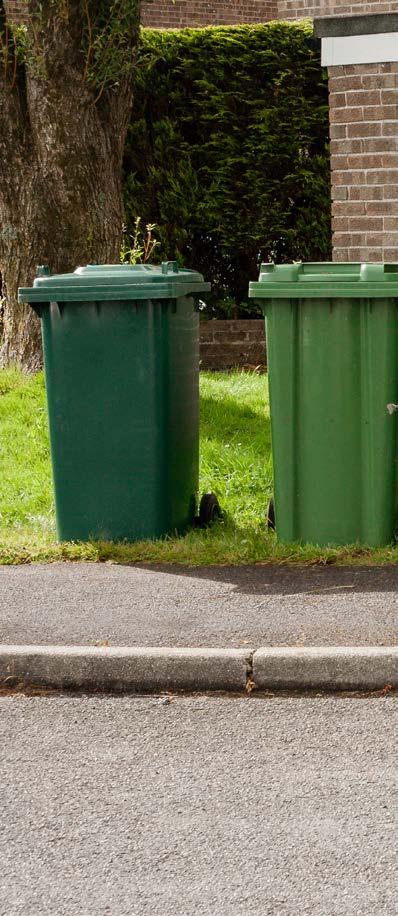
– You can put out extra recycling beside your green bin on recycling day – but these extra bags must be labeled ‘extra recycling’ with the first line of your address on the label too.
The Sustainability website is a great resource for information on what the University is up to on energy, waste, protecting wildlife and much more on the Exeter campuses.
Keep up to date with the latest sustainability related news and activity by following the Sustainability Team on @uoesustainability or signing up to our monthly newsletter.


Exeter has many glass and textile bank sites and several carton recycling banks. Most supermarkets have recycling points that you can use when you go shopping, but you can check recycling bank locations here: exeter.gov.uk/recyclingbanks
Every summer in Term 3 the University pays for extra refuse collections so that the waste can be collected outside normal collection times. Look out for ‘Students on the Move’ information closer to the time. See page 28 for more information.
(for the stuff that can’t be recycled)
When putting out the rubbish, remember the following:
n Check where and when your rubbish is collected, either by talking to neighbours or by downloading your bin calendar.
n Only put your bins out after 6pm the evening before collection, but before 6am on collection day.
n Bins or waste sacks should not be left on the pavement in between collections. It causes an obstruction, especially for those with disabilities.
Your bin calendar
Keep up to date with collection days by downloading your bin calendar from the Council website. Add your address to instantly see when your bins go out. Print it and stick it on your fridge.
Rubbish and recycling collections often change around a UK bank holiday and this calendar will tell you about those.
n If the Council removes your bin because you have been storing it on the pavement, or if it goes missing for any other reason, your household will be charged for a new one.
n Overfilled black bins (i.e. with bin lids sticking up) and extra black bags of rubbish won’t be collected.
n You should clear up any waste on the pavement which may occur from split bags as soon as you notice it.
n You could be fined if you don’t manage your household waste correctly.
n Look after your bins, because you can get charged for new ones. Call 01392 265010, contact the Council via exeter.gov.uk/contact or visit exeter.gov.uk/domesticwaste for advice.
The good news is that the vast majority of students living in Exeter have a really positive relationship with their neighbours. Only a very small number of students raise concerns that result in intervention from the University or other agencies, including the Police.
Please consider your neighbours when walking to and from your property, particularly late at night. Street noise, or ‘transient noise’ can cause just as much disturbance to neighbours as parties – particularly those with children, or early morning work commitments.
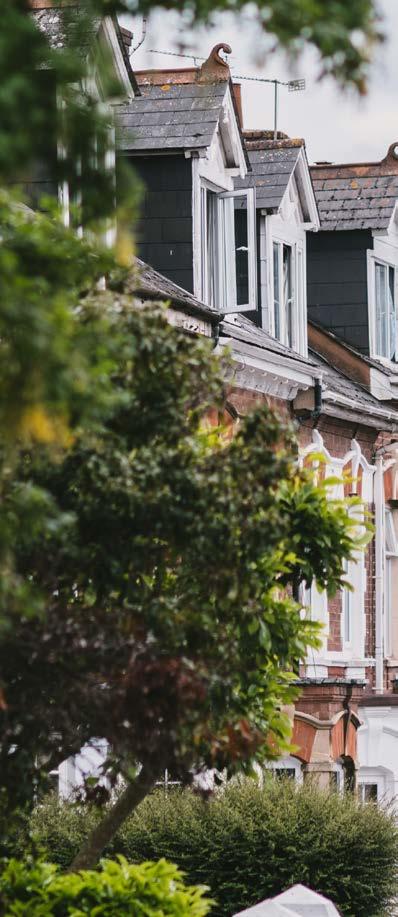
ASB is defined as “Behaviour by a person which causes or is likely to cause harassment, alarm or distress to one or more persons not of the same household as the person”.
(Antisocial Behaviour Act 2003 & Police Reform and Social Responsibility Act 2011).
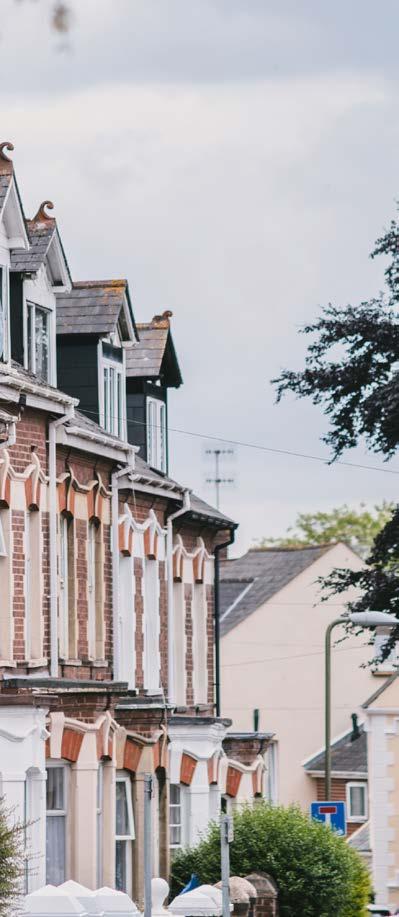
When living off-campus it is important to be aware of the following facts:
n Student regulations clearly state that students are expected to have consideration and respect for neighbours. The University can, and does, explore conduct issues that occur outside the campus boundaries. We will also provide advice and support when students are the victims of anti-social behaviour or harassment.
n We’ve had an increasing number of students reporting noise/disturbance from other properties. It is important to consult with your neighbours before organising a party/social – including both your student and non-student neighbours.
n As the tenants of a property you will be held accountable for the actions of those attending a gathering. Legal action could be taken against you, including fixed penalty notices, seizure of equipment, prosecution and fines. You could get a criminal record which may have an impact on your future career.
n If you are hosting one-off event, involving licensable activities (like selling alcohol, providing entertainment, or serving late-night refreshments) –you may need a Temporary Events Notice. To host an event without such a notice could lead to legal action.
n Letting your neighbours know you are having a party does not mean you can be as loud or late as you want, you still need to be reasonable.
n Think about numbers. More people at a party means more noise and it will be more difficult to manage.
n Noise travels, this can be particularly disturbing at night, so keep people inside with doors and windows closed.
Please remember that noise travels – follow the checklist to reduce the chances of a legal action from the Council or formal investigation by the University.
Note that the checklist below applies to any significant gathering/party or pre-drinks.
1. We have consulted with neighbours living all around our property two to three days before our gathering.
2. We have ensured that start and finish times have been agreed with neighbours and, if neighbours are not at home, we have issued a letter with full details.
3. We have taken into account our neighbours’ working hours/study commitments and/or childcare priorities.
4. We have made preparations to keep windows closed, moved sound systems away from walls and reduced noise/ bass levels.
5. We will manage guests appropriately and recognise that all tenants are jointly responsible for the conduct of any visitors.
6. We will ensure that guests/tenants will not cause disturbances outside of our property – particularly at the start and end of our social.
7. We have ensured that all tenants living at our address are fully consulted on any socials being arranged – even if only a minority of tenants are involved.
8. We will not use high-bass/high decibel sound systems and acknowledge the increased noise levels could result in the issue of noise abatement notices.
9. We will not permit student clubs/ societies to host large scale socials or pre-drinks at our address and accept that all registered tenants will be liable if such socials go ahead.
10. If we are hosting one-off event, involving licensable activities (like selling alcohol, providing entertainment, or serving late-night refreshments) – we will not proceed until we are sure we don’t require a Temporary Events Notice.
11. We will provide neighbours with a way of contacting us if there are any issues.
Please note – even if you follow the checklist, it does not give you permission to then make noise that is simply excessive. Following these steps is a very good start, but they will not protect you from conviction if the noise you then create is simply far too loud.

Our Community Liaison Team has more than fifteen years’ experience dealing with noise concerns. Here are their top tips:
n Neighbours who are on first name terms are far more likely to talk to you if there is a problem –and far less likely to raise formal concerns with the council or University. Introduce yourself to your neighbours – popping a note through the door followed by a chat over the fence or on the phone will help break the ice.
n There is no legal cut-off time for when ‘noise’ can or can’t occur. The best way is to consult with neighbours about what time limits work for them. Being able to evidence this will reduce the likelihood of a negative outcome.
n Front door won’t close properly? Fire-doors slamming inside? Poor insulation between your house and next door? If these issues are causing noise concerns for you and your neighbours, it might be that your landlord needs to take some action.
Contact communityengagement@exeter.ac.uk if you have concerns.
Students on the Move scheme:
We know it seems far away now but the year will fly by and if you’re in private rented accommodation it’ll soon be time to leave your house again.
Here are some things to remember:
n Change your address two to three weeks before the move so you don’t miss out on any essential post. Royal Mail can provide a re-direct service for a charge.
n Unsubscribe the gas, electricity, water, phone, etc. otherwise they’ll keep charging you. Try to call them as soon as you know your moving out date and take meter readings on the day you leave.
n Check the photos from when you moved in to ensure that everything is still in order. This includes going through the house inventory. Take date-stamped photos of every room the day you move out. This can help save your depositespecially if the landlord contests the state of the property.
n Too much stuff? Old pots and pans you don’t need? There are collection points in University managed accommodation at the end of the year. Alternatively, take your items to one of Exeter’s many charity shops – do you need a doorstep collection from the British Heart Foundation? Contact the Community Engagement Officers for advice.
n Good clean fun! Book a day with all your housemates to clean up and put
furniture back in the right place before you move. Leaving it all for the last person is not what you want to do! At the end of the academic year we run a ‘Students on the Move’ scheme to help via additional refuse collections. Get your ‘Students on the Move’ stickers to make sure that you don’t get fined for putting your rubbish out after collection. Email communityengagement@exeter.ac.uk to place an order. If you missed the last bin day or want other advice go to exeter.gov.uk/recycling
n Speak to the landlord to set up an inspection date when you are still around to inspect the house together.
n Return your parking permit! – If you do not return your parking permit the next tenants for your address will not be able to apply for one. Please ensure that you liaise with your landlord or letting agent about parking permit returns before you leave!
n If you have a disagreement with your landlord about money being taken from your deposit, you can get support from the Students’ Guild Advice Team.
n Take your bins back inside your property boundary when you leave. Do not leave them on the pavement. Bins left on pavements after you depart will be confiscated by the City Council and your Landlord might pay for a replacement bin using your deposit.
Chaplaincy – The Chaplaincy team supports people of all faiths and none. 01392 723649 / exeter.ac.uk/chaplaincy
Community Patrol – If you are bothered by noise from premises: 01392 265147 (before 5pm).
Estate Patrol – For issues connected to security on campus and to investigate noise/disturbances in private student accommodation after 10pm: 01392 723999
Exeter City Council’s Cleansing Services –For missed bin collections, to request additional bins or to make recycling enquiries: exeter.gov.uk/domesticwaste
Exeter City Council’s Environmental Health team – To report accumulations of rubbish likely to harbour or attract vermin: 01392 265193 / exeter.gov.uk/domesticwaste
Flytipping Service – For removing rubbish that you think has been dumped illegally: exeter.gov.uk/flytipping
Students’ Guild Advice Service – Free and impartial advice on a range of issues, such as academic, financial and housing. Email: advice@exeterguild.com
Don’t forget to register with a doctor (GP):
n Student Health Centre (for Streatham students) www.stthomas.nhs.uk/registerwith-us
n The Heavitree Practice (for St Luke’s students) theheavitreepractice.co.uk
n Find your nearest doctor’s practice –nhs.uk/service-search/find-a-gp
Support and Report – If you have been affected by discrimination, bullying, intimidation or harassment including sexual harassment, we have a wide range of support for you. You can also report it to us: exeter.ac.uk/students/support-report
Community Engagement Team –For non-emergency community queries contact the University or your Community Engagement Team: 01392 723721 / communityengagement@exeter.ac.uk
Wellbeing Services – A free and confidential service to support you both personally and in your studies. In-person and online support services for your mental health and wellbeing, and advice and support if you have a disability or long-term health condition, including specific learning difference and neurodivergence. Contact: 01392 724381 / wellbeing@exeter.ac.uk / exeter.ac.uk/wellbeing
Emergency contacts:
Police emergencies – 999
Police non-emergencies – 101
Fire Service emergencies – 999
Fire Service non-emergencies dsfire.gov.uk/contact-us
Medical emergencies – 999 (ambulance service)
24 hour health advice (including mental health) NHS 111 – Call 111 or online 111.nhs.uk
Emergency on the coast – call 999 (the Coastguard)
There are lots of ways that you will receive updates from the University. Key communications that are tailored to our Exeter campuses are:
Download the MyExeter app free from your app store.
A weekly newsletter for students in Exeter sent by email on Mondays, during term time, and posted here: exeter.ac.uk/students/news/inbrief
Social media
Follow our student social media accounts for the latest events and updates: @uniofexeterstudents @exeterunistudents
Your International News
A monthly newsletter for international students and posted here: exeter.ac.uk/students/international/ livingintheuk/getinvolved
